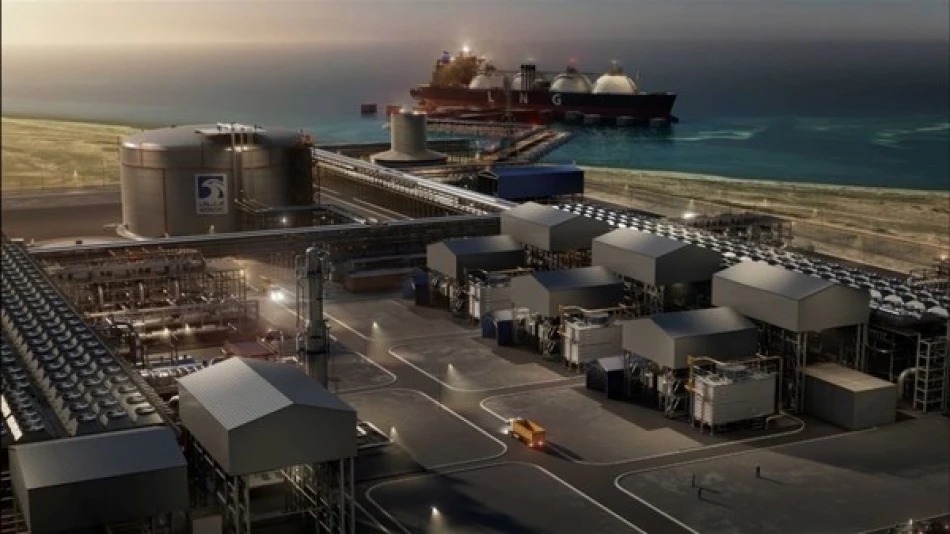
ADNOC Inks 15-Year Crude Oil Supply Deal with India's ONGC Videsh
ADNOC Locks in India's Largest Energy Company for 15-Year LNG Deal Worth Billions
Abu Dhabi National Oil Company (ADNOC) has secured a landmark 15-year liquefied natural gas supply agreement with Indian Oil Corporation Limited, India's largest integrated energy company, for one million tons annually. The deal, primarily sourced from ADNOC's upcoming Ruwais LNG project, positions the UAE as a critical energy partner for Asia's third-largest economy while advancing the Gulf state's ambitions to become a dominant force in global LNG markets.
Strategic Partnership Transforms Preliminary Agreement into Binding Contract
The new agreement converts a previously signed heads of terms into a binding sales and purchase contract, marking a significant milestone in UAE-India energy relations. Under the deal's flexible terms, LNG can be delivered to any port across India, providing crucial supply security for the nation's rapidly expanding energy needs.
By 2029, Indian Oil Corporation is set to become ADNOC's largest LNG customer globally, with total contracted purchases reaching 2.2 million metric tons annually. This includes 1.2 million tons from ADNOC's existing Das Island facility and the additional one million tons from the new Ruwais project.
Ruwais Project: A Game-Changer for Middle Eastern LNG
Clean Energy Pioneer in Regional Context
The Ruwais LNG project, scheduled to begin commercial operations in 2028, represents a technological leap for the Middle East's energy sector. As the region's first clean energy-powered LNG export facility, it will rank among the world's lowest carbon-intensity LNG plants—a crucial advantage as global buyers increasingly prioritize environmental credentials.
The facility will deploy cutting-edge technologies, including artificial intelligence solutions to enhance safety, reduce emissions, and optimize operational efficiency. This positions ADNOC ahead of regional competitors like Qatar and Saudi Arabia, who are also expanding their LNG capabilities but with higher carbon footprints.
Market Demand Validates Investment Strategy
ADNOC has already committed over 8 million tons annually of Ruwais's total 9.6 million ton capacity through long-term supply agreements with international customers. This 83% pre-commitment rate demonstrates robust global demand for low-emission LNG and validates the UAE's multi-billion dollar investment in the project.
Asian Market Strategy Reflects Global LNG Dynamics
The India deal underscores ADNOC's strategic focus on Asian markets, where LNG demand continues surging despite global economic uncertainties. Unlike the volatile European market, which scrambled for alternative supplies following the Russia-Ukraine conflict, Asian buyers like India seek long-term partnerships to fuel industrial growth and residential needs.
This approach mirrors successful strategies employed by Australia's LNG exporters and Qatar's expansion plans, where securing anchor customers through long-term contracts provides revenue certainty and financing confidence for massive infrastructure investments.
Broader Implications for UAE-India Economic Partnership
The LNG agreement builds on the comprehensive economic partnership signed between the UAE and India in 2022, which has already boosted bilateral trade and investment flows. Energy cooperation represents a cornerstone of this relationship, with India viewing the UAE as a reliable alternative to traditional suppliers while the Emirates seeks to diversify its customer base beyond traditional European markets.
Investment and Ownership Structure
ADNOC Gas announced in November its intention to acquire ADNOC's 60% stake in the Ruwais LNG project at cost price during the second half of 2028. This internal restructuring will double ADNOC Gas's LNG production capacity to over 15 million tons annually once Ruwais becomes operational, significantly enhancing the company's market position and financial performance.
The deal positions ADNOC as a formidable competitor in the global LNG market, particularly as new supply projects face increasing development challenges and cost pressures worldwide. For investors and energy markets, this agreement signals the UAE's successful transition from primarily an oil exporter to a diversified energy powerhouse capable of meeting 21st-century demand patterns.
Most Viewed News

 Layla Al Mansoori
Layla Al Mansoori






